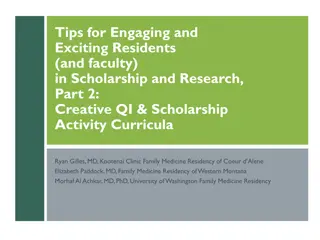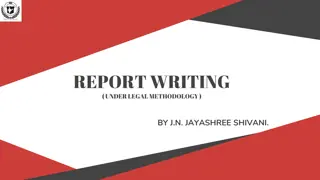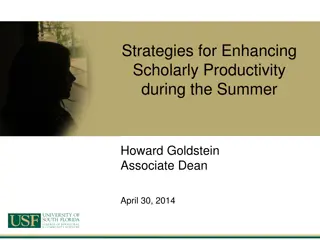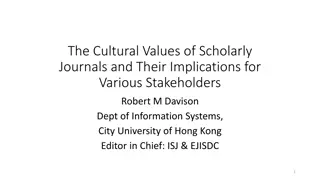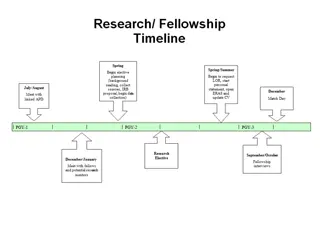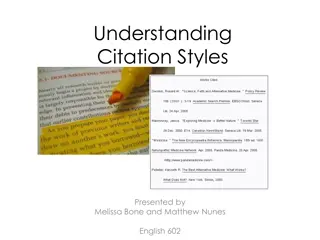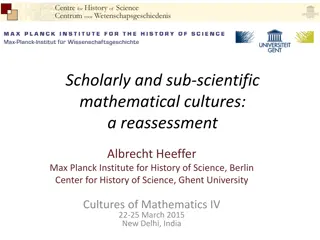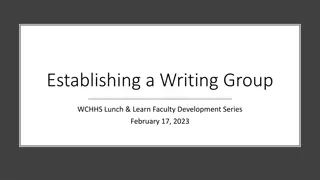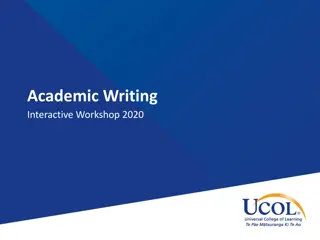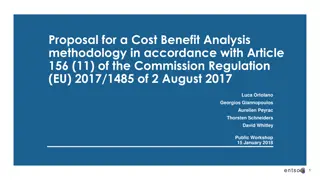The Purpose and Methodology of Scholarly Legal Writing
Scholarly legal writing serves to advance knowledge within specific fields by offering in-depth analysis, historical context, and contributing new insights to legal literature. It distinguishes itself from practice-related writing by focusing on research, surveying existing knowledge, and engaging in debates to expand the understanding of legal topics.
Download Presentation

Please find below an Image/Link to download the presentation.
The content on the website is provided AS IS for your information and personal use only. It may not be sold, licensed, or shared on other websites without obtaining consent from the author. Download presentation by click this link. If you encounter any issues during the download, it is possible that the publisher has removed the file from their server.
E N D
Presentation Transcript
Lawyering Process Memos Briefs Motions Purpose of legal writing learned in LP
The purpose academic and scholarly writing Scholarly writing is distinct from practice related legal writing primarily in its purpose. In scholarly writing one has time to ponder a legal question; it is a way for the writer to enter the dialog about a particular legal topic. Practice related writing is result oriented. Its focus is usually a specific case/fact scenario and its purpose is to accomplish something about that case.
The purpose of scholarly writing is the advancement of knowledge within a specific field. More than a demonstration of the author s expertise, scholarly writing is produced to add to the body of knowledge, extending, challenging, or expanding what is known or believed within the field.
scholarly writing might explain the history of that law, how it developed and got to be where it is today, then discuss and analyze that law. Generally a scholarly piece of writing will have one or more highly footnoted sections at the beginning that indicate what the writer s thorough research has revealed about the topic that information will then form the basis for a more lightly footnoted analysis and evaluation that is appropriate to the specific document.
The research sections will include whatever background that the reader will need to understand the analysis section and might include a factual or statistical component, a methodology section, a history or survey of the law. The analysis section is the writer s opportunity to add to the ongoing debate on the topic and to make a significant contribution to legal literature. is the writer s opportunity to add to the ongoing debate on the topic and to make a significant contribution to legal literature.
Most scholarly articles focus on research, or survey the literature, in a particular topic. In a research article, one emphasizes primary sources and often argues for action or change. A literature survey emphasizes secondary sources, reporting on the state of existing knowledge or practice.
1. Introduction - proposal, hypothesis, rationale for study Background - underlying concepts, issues, facts, legal doctrines Arguments, Explanations, Discussion - "prove" your claim; as needed, refute opposing arguments Relationship to wider, parallel, and/or subsidiary topics; may also place article within existing literature Proposal for action, change, further research Conclusion - restate introduction and summarize findings 2. 3. 4. 5. 6.
The research sections will include whatever background that the reader will need to understand the analysis section and might include a factual or statistical component, a methodology section, a history or survey of the law. The analysis section is the writer s opportunity to add to the ongoing debate on the topic and to make a significant contribution to legal literature.
Essays Law Review Articles Student Notes/Case Note Seminar Papers
An essay as "a fairly brief piece of nonfiction that tries to make a point in an interesting way." An essay all fits together; it all points in one direction. An essay leads to one conclusion. Another way of putting it would be to say that an essay doesn't just have a topic; it also has a thesis. An essay doesn't just give information about a subject; it supports a statement, a claim.
A law review focusing on legal issues, normally published by an organization of students at a law school The primary function of a law review is to publish scholarship in the field of law. Law reviews publish lengthy, comprehensive treatments of subjects ("articles"), generally written by law professors, as well as shorter pieces, commonly called "notes" and "comments," written by law student "members" of the law review. law review (or law journal law journal) is a scholarly journal
Law review articles often express the thinking of specialists or experts with regard to problems with current law and potential solutions to those problems. Historically, law review articles have been influential in the development of the law, and have been frequently cited as persuasive authority by the courts in the United States, although some claim that this influence is declining.
Scholarly report of a recent significant decision Concise analysis of an opinion Contains citations to related cases and important secondary authorities
1. Introduction 2. Brief Background 3. Roadmap/Scope 4. Prior Law 5. Main Case 6. Analysis 7. Conclusion
A white paper guide that helps readers understand an issue, solve a problem, or make a decision. a problem/solution white paper is a persuasive essay, sponsored by a certain organization to provide helpful information about overcoming a certain problem. Today's "typical" white paper is 6 to 8 pages long white paper is an authoritative report or
A document that contains narrative text At least 5-6 pages long, in portrait format Educational, practical and useful, NOT a sales pitch Used BEFORE a sale, not AFTER a sale Provides facts, NOT just opinion Includes an introduction or executive summary.
Most good works of original scholarship have a basic thesis a claim they are making about the world. You should be able to condense that claim into one sentence, for instance: 1. 2. 3. Such-and-such a law is unconstitutional. The legislature ought to enact the following statute. Properly interpreted, this statute means such-and- such. My empirical research shows that this law has unexpectedly led to .... Viewing this law from a [feminist / Asian studies / Catholic / economic] perspective leads us to conclude that the law is flawed, and should be changed in such- and-such a way. 4. 5.
The experience will hone your writing, quite likely a lawyer's most important skill. And some student articles actually influence judges, lawyers, and legislators; even the U.S. Supreme Court cites student works several times each year.
1. Thinking 2. Preparing 3. Executing 4. Refining 5. Finishing

 undefined
undefined











